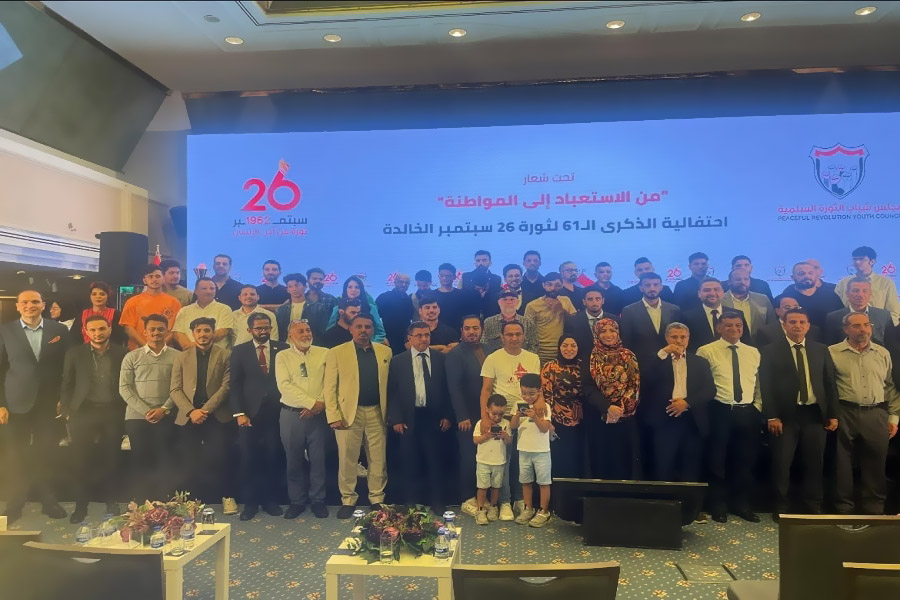Today, on Sunday, the Peaceful Revolution Youth Council orchestrated a remarkable gathering in Istanbul, Turkey. This event held great significance as it marked the 61st anniversary of the timeless September 26 Revolution. Under the inspiring slogan "From enslavement to citizenship," the council orchestrated a special commemoration to honor this historic milestone.
Amidst the festivities, distinguished guests, including the Nobel Peace Prize laureate Tawakkol Karman and notable Yemeni political figures, graced the occasion. One of the esteemed members of the Coordinating Body of the Revolutionary Youth Council, Abdul Rahman Batis, took the stage to deliver a statement on behalf of the council.
In its powerful statement, the Youth Council reaffirmed the profound impact of the Yemeni people's struggle for national liberation on September 26, 1962. It was emphasized that this pivotal battle has the potential to forever lay to rest the remnants of the Imamate era. The statement stressed the indivisible nature of their cherished national principles and achievements, namely the republic, unity, and democracy. They emphasized that any disregard for these fundamental pillars would amount to a betrayal of the September Revolution and the sacrifices made by its valiant heroines.
The statement highlights that the ongoing national struggle is currently unfolding through multiple avenues. On one front, the nation confronts the resurgence of racist gangs, posing a significant threat. Simultaneously, it contends with the looming specter of external occupation, which not only strengthens the Imamate's influence but also bolsters their continued presence in other realms.
The Council's statement acknowledges that the current battle of the Yemenis today, facing the despicable sectarian, racist, and obscurantist Houthi project that seeks to reproduce the Imamate system through the same opportunistic religious discourse and oppressive terrorist practices. It considers this moment as a significant milestone for a profound examination of this greatest historical event, its achievements, and the heroic sacrifices of its men, whose pure blood has enriched the Yemeni soil in the pursuit of building a modern nation-state based on the principles of law and citizenship.
The statement highlighted that September, October, November, May, and February are indelible milestones in Yemeni history, guarded by the collective will of the Yemeni self that is resilient to breakage, alienation, and oppression, and praised the vigilant national state derived from the spirit of September as well as the steadfastness of the vocal ranks in the face of the projects of imamate, occupation, and dismemberment.
The Council emphasized that the Republic of Yemen - from its north to its south and from its east to its west - including its occupied capital and every inch of the homeland's land, will be returned to its rightful owners, whether time is long or short, for tomorrow is another day.
Following that, a special production of national songs titled "Middly" was presented by the Belqees TV Channel as a celebration of the occasion. During the celebration, a panel discussion titled "Literature and Poetry of the September Revolution in Yemen" took place. The discussion was moderated by Yasser Al-Atrash, a Syrian poet and journalist, and featured Yemeni writer and journalist Jamal Anam, as well as Yemeni writer and researcher Zaid Jaber, as participants.
According to writer and researcher Zaid Jaber, poetry stands as a significant character within the Yemeni revolution. It served as a powerful weapon and a means for the revolutionaries to ignite the aspirations of the people. Jaber pointed out that literature acted as the guide and harbinger of the revolution, noting that novels, from their inception, have chronicled every stage of the Yemeni struggle.
Jaber believed that the revival of the Imamate came as a shock to the fabric of Yemeni society, and he expressed the opinion that the Republican elite did not adequately address the impending danger and its implications. He further added, "Nevertheless, there exists a new generation of poets who confront the challenges posed by the imamate and tread in the footsteps of renowned Yemeni figures like Al-Zubayri and Al-Baradouni."
Jaber underlined the presence of literature being forged amidst adversity, with the potential for future growth. He noted that present-day poetry cannot be equated with the poetry that characterized the September 26 Revolution. He emphasized, "While popular and contemporary poetry exists, engaging in the fight against the Houthi militia, it does not attain the elevated status of poetry exemplified by figures such as Al-Baradouni and Al-Zubairi."
On one hand, writer and journalist Jamal Anam revealed that the Houthi militia made an attempt to exploit Al-Baradouni by publishing two poetry collections under his name, seeking to benefit from his reputation. Anam emphasized that only a few individuals who had the privilege of meeting the renowned Yemeni poet discussed the existence of these two missing collections, which Al-Baradouni had mentioned in a press interview conducted by Anam a year prior to his passing, and he further noted that these collections were reportedly printed in "Cyprus."
Jamal Anam stated that the Imamate regime enforced its cultural system in various aspects, including poetry, literature, poems, Zamil, and more, until the 1948 revolution emerged. Despite its failure, this revolution played a significant role in bringing forth renowned writers and poets such as Abdul Rahman Al-Iryani, Muhammad bin Ali Al-Akwa, and others, who emerged amidst the tremendous struggle of that period.
When asked about the lack of support from Arab poets for the Yemeni revolution, Jamal Anam explained that Yemen had been living in a state of isolation, influenced by external factors, and this isolation was evident in its literature. However, he emphasized that any poetry that champions freedom and represents the struggles of people, regardless of its origin, becomes significant and can be seen as speaking about Yemen, which holds great importance.
Anam emphasized the need to revive the critical movement in order to empower young Yemeni poets, citing figures such as Yahya Al-Hammadi and Amer Al-Saeedi, who are fervently engaged and driving the poetic scene forward, while underscoring Yemen's enduring devotion to both eloquent and popular poetry.
In the end, the special celebration concluded on a captivating note with the remarkable performances of three patriotic songs by talented young voices. The melodies resonated with the spirit of patriotism and unity, evoking a strong sense of pride and hope for the future. These performances served as a testament to the timeless power of music in conveying deep emotions and fostering a sense of togetherness, while also reminding us of the rich cultural heritage and unwavering resilience of the Yemeni people.

